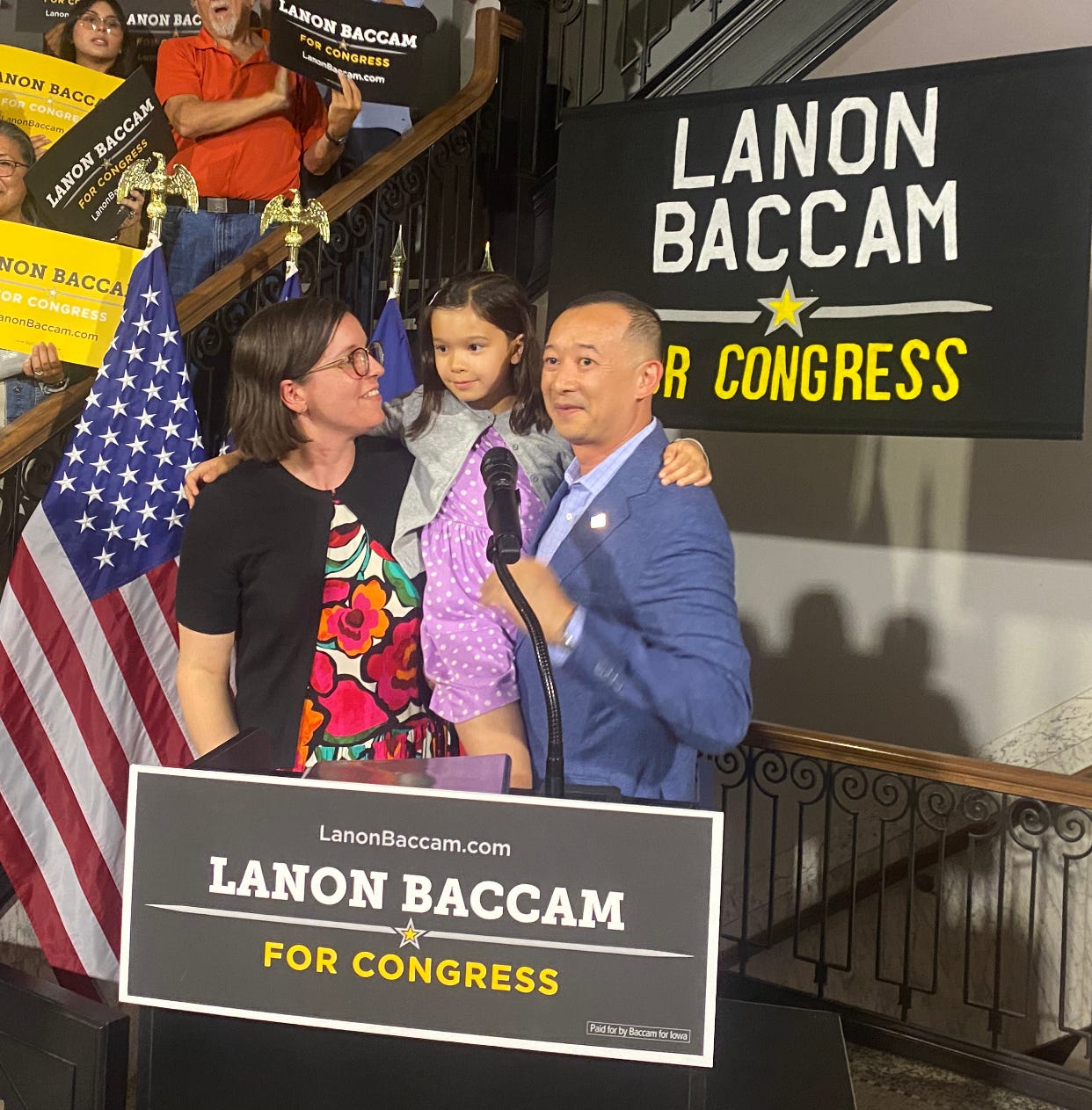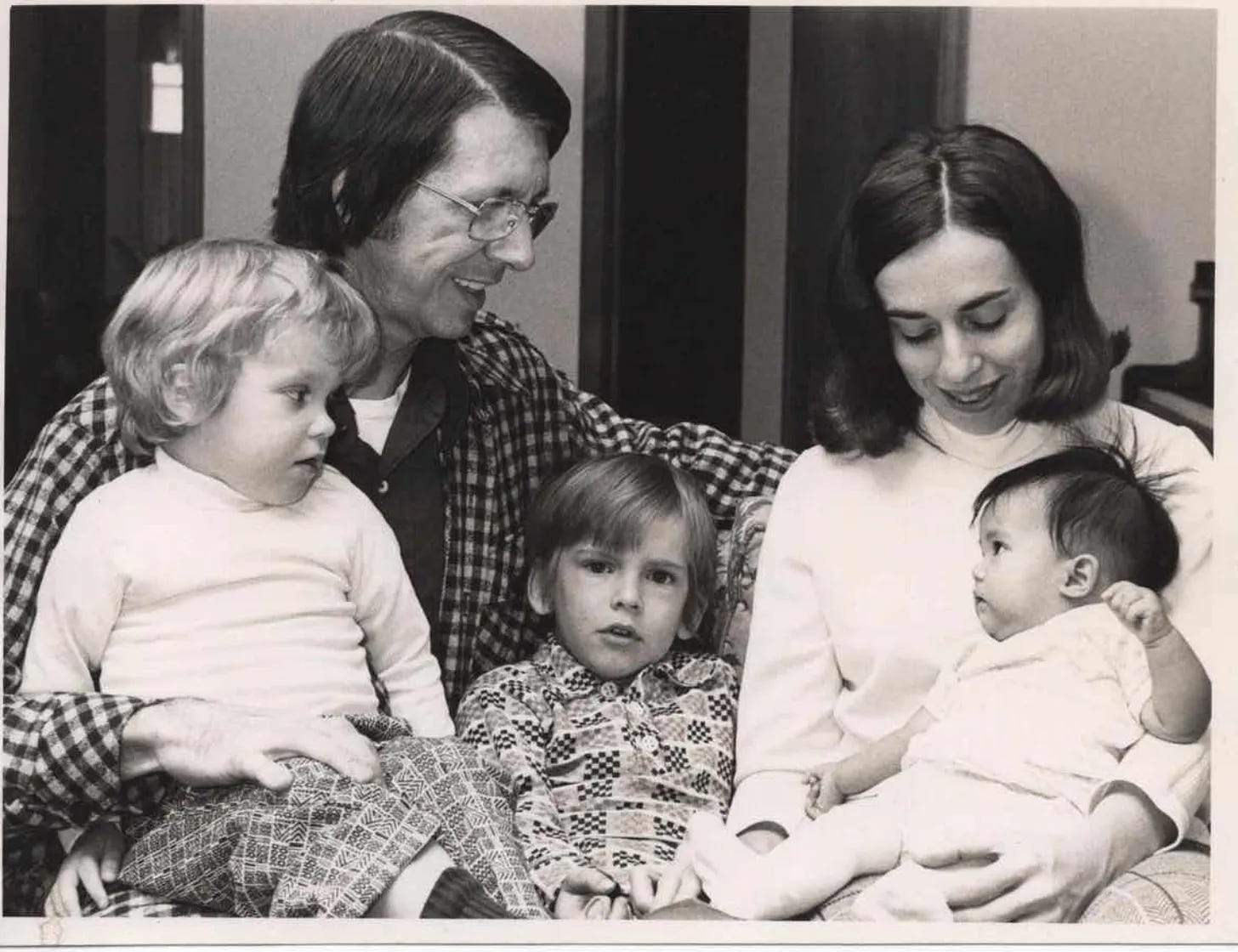Lanon Baccam: 'I’m looking at Doug Burns right now, because his family looks like my family.'
How a congressional candidate is seeking a restoration of Iowa at its best

There’s not supposed to be any crying in politics.
Only sometimes there is. My own tears, even.
Iowa Congressional candidate Lanon Baccam, born in Mount Pleasant and raised by his immigrant parents, spent part of a summer speech talking about the Iowa of our youth when this state soared. Immigrants and blended families were embraced. Vision and kindness and big-heartedness prevailed in the state under Gov. Robert Ray as we absorbed abandoned kids and refugees fleeing violence.
At one point Baccam motioned to me in the audience.
“I’m looking at Doug Burns right now, because his family looks like my family,” Baccam said during a speech to the Iowa Farmers Union in Elkhart, rural Polk County.
I employed a reporter’s notebook, a downward glance and a raised right hand to hide the tears streaming down my face. The moment remains with me, and it defines my admiration for Baccam, a military veteran and former top U.S. Department of Agriculture official who shares my views on aggressive rural economic re-development in Iowa in addition to a similar family biography.
It’s this straightforward: The Iowa Lanon Baccam comes from is my Iowa. I’ve sensed this in interviews with Baccam over the campaign. I witnessed it at his primary night gathering in downtown Des Moines.
In a way, I knew Lanon Baccam before I knew him.
Baccam’s family and mine are in something of a demographic mirror.
I’m adopted. So is my sister, Jane. Jane arrived in our home as Saigon fell. I made my way into the adopted family in Carroll as Cedar Rapids rose.
I was born at Mercy Hospital in Iowa’s second-largest city and adopted as a baby. Jane’s journey is much more harrowing.
My sister, Jane (Burns) Nguyen, is a Vietnam War orphan who was evacuated from Saigon in April of 1975.
Jane, who turned 50 today and has had an estimable career teaching English in the Des Moines schools to other refugees from across the globe, arrived in Chicago as part of Operation Babylift. The four of us — mom, dad, my brother Tom and myself (none of us biologically related) — were there. News broke at 5 a.m. that a C-5 military cargo plane crashed in rice paddy outside of Saigon, killing 78 children and 50 adults.
We did not find out until noon that Jane, 6 months old at the time of her adoption, was not on the plane. She was O'Hare bound. My sister was alive. When we arrived home I snuck out of my room at night, blanket in hand, and slept under my sister’s crib for days — you know, because a little boy, armed with a pillow and outfitted in groovy 1970s pajamas, thinks he can protect his little sister from more plane crashes.
"I was excited to finally get her," mom said. "We had been in the process for months. The last part of our wait was very trying. There were plane crashes with babies from Vietnam."
Our home had always been filled with diversity. Now we had Jane (who today writes The Asian Iowan column as a member of the Iowa Writers' Collaborative).
"Children in Vietnam needed homes, new schools, safety, so much," mom said. "It filled many bills."
In our childhoods, I always felt as if we were value-added Iowans, that the whole of the family, formed through adoption, was greater than the sum of its parts.
Now, painfully, our origin stories, our sense of security and pride, are the source of political attacks — with JD Vance excoriating women who do no have babies or keep their unwanted babies — women like my biological mother who bravely declined Vance-like bedside marriage proposals from my biological father and put me up for adoption.
As for my sister, well, Trump’s inciting language on immigrants is well chronicled. Donald Trump is American carbon monoxide as the hate he’s summoned from millions seems to pollute the air itself.
Back to better times …
My animated and witty sister brought so much joy to our home, and for me, the presence of a little sister who does not look like me, shaped an approach to life in which I did not have to act or adjust to people of different backgrounds — one of the reasons, I'm sure, for the diversity of friends and colleagues in my life.
"I think it meant we had many good experiences that others didn't — like helping to settle five young men from Vietnam," mom said. "We had some exposure to the war from the Vietnamese perspective. I think we all grew in many ways by having a child who was not white. We saw bad responses, we saw good responses, and we learned how to deal."
For his part, Baccam, a Democrat now living in Des Moines, is facing Republican Congressman Zach Nunn, a military veteran himself, in the November general election.
Baccam said Iowans should be proud of their legacy. Baccam's parents emigrated to Mount Pleasant in 1980, part of the waves of refugees resettled in Iowa under former Gov. Robert Ray's leadership.
Natives of Laos, his parents, Tai Dam refugees, worked at the Mackay envelope factory. They still live in Mount Pleasant.
"My family was sponsored by a Swedish Lutheran family that had come to the United States like 40 or 50 years earlier," Baccam said. "They were first-generation immigrants themselves. They were farmers in the small town of Swedesburg, north of Mount Pleasant. It was a tiny little town."


Baccam credited Republican Ray with the foresight and courage on the resettlement of his family.
"This is to me like an incredible legacy we should be proud of," Baccam said. "People need to be reminded of it. Iowa has had this incredible progressive legacy of actually standing up for people around the world when they need it."
Today, Baccam lives two blocks from where his wife grew up in Des Moines. His daughter attends Hubbell Elementary School.
"It's amazing that my daughter runs up and down these same steps, these super-worn marble steps that my wife did," Baccam said. "Generations of people have worn down these steps and added to the character of this incredible school, and it's really quite special to me."
(Douglas Burns, founder of The Iowa Mercury and a fourth-generation Iowa journalist from Carroll, is a member of the Iowa Writers’ Collaborative. Read dozens of the most talented writers in Iowa in just one place. The Iowa Writers' Collaborative spans the full state. It’s one of the biggest things going in Iowa journalism and writing now — and you don’t want to miss. This collaborative is — as the outstanding Quad Cities journalist Ed Tibbetts says — YOUR SUNDAY IOWA newspaper. )





Wonderful story, Doug, full of great reminders for us all about holding open our hearts, minds and arms to others.
Thank you, Doug. Your story and Lanon's story are such a powerful reminder of, as you describe, the Iowa of our youth when this state soared; when vision and kindness, and big-heartedness prevailed. I pray we will become that Iowa again.